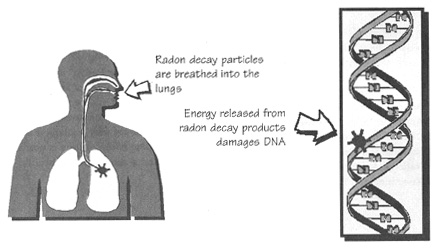Radon Health Risks
Radon is the #1 environmental hazard in the U.S. and the 2nd leading cause of lung cancer deaths in the country. An estimated 21,000 lung cancer deaths annually are due to high levels of radon exposure over a period of time. Reducing radon gas through a radon mitigation system and radon testing is vital to preventing radon exposure.
How Does Radon Lead to Lung Cancer?
When high levels of radon gas are released into the air and then inhaled, tiny radioactive particles can lodge in the lining of the lungs, where they can damage or kill lung cells. This process, in turn, can cause lung cancer. Although smokers are 10 times more likely to develop radon-related lung cancer, radon causes a substantial number – nearly 3,000 - of lung cancer deaths among non-smokers in the United States.
Who Else is Affected by Radon Poisoning?
Smokers should be especially cautious of radon as they are 25 times more likely to develop lung cancer than non-smokers.
Children are, unfortunately, more susceptible to radon-induced cancer. According to the U.S. Agency for Toxic Substances and Disease Registry, children exposed to radon may be at almost twice the risk as adults. If children are exposed to radon and to tobacco smoke, their risk of getting lung cancer is at least 20 times higher.
The American Lung Association says that many people with early stage lung cancer don't have symptoms. When symptoms are present, they are different in each person, which is why it is important to see your doctor if you experience any of these symptoms:
- A cough that doesn't go away and gets worse over time
- A chronic cough or "smoker's cough"
- Hoarseness
- Constant chest pain
- Shortness of breath or wheezing
- Frequent lung infections such as bronchitis or pneumonia
- Coughing up blood
Radon has been classified as a Class A human carcinogen based on research founded by the U.S. Environmental Protection Agency (EPA), the World Health Organization, the National Academy of Sciences, and the US Department of Health and Human Services. (See Radon Health Studies).
Radonaway is committed to reducing radon and preventing radon poisoning with our radon mitigation systems, radon fans, and radon testing systems.

Contact a Qualified Radon Professional
If you have recently discovered elevated levels of radon in your home, would like to know what your radon level is, or would like to know whether your existing radon system is functioning properly, click below and a qualified RadonAway Authorized Radon Professional who is certified in radon mitigation or radon testing, will contact you directly.



Validate your login